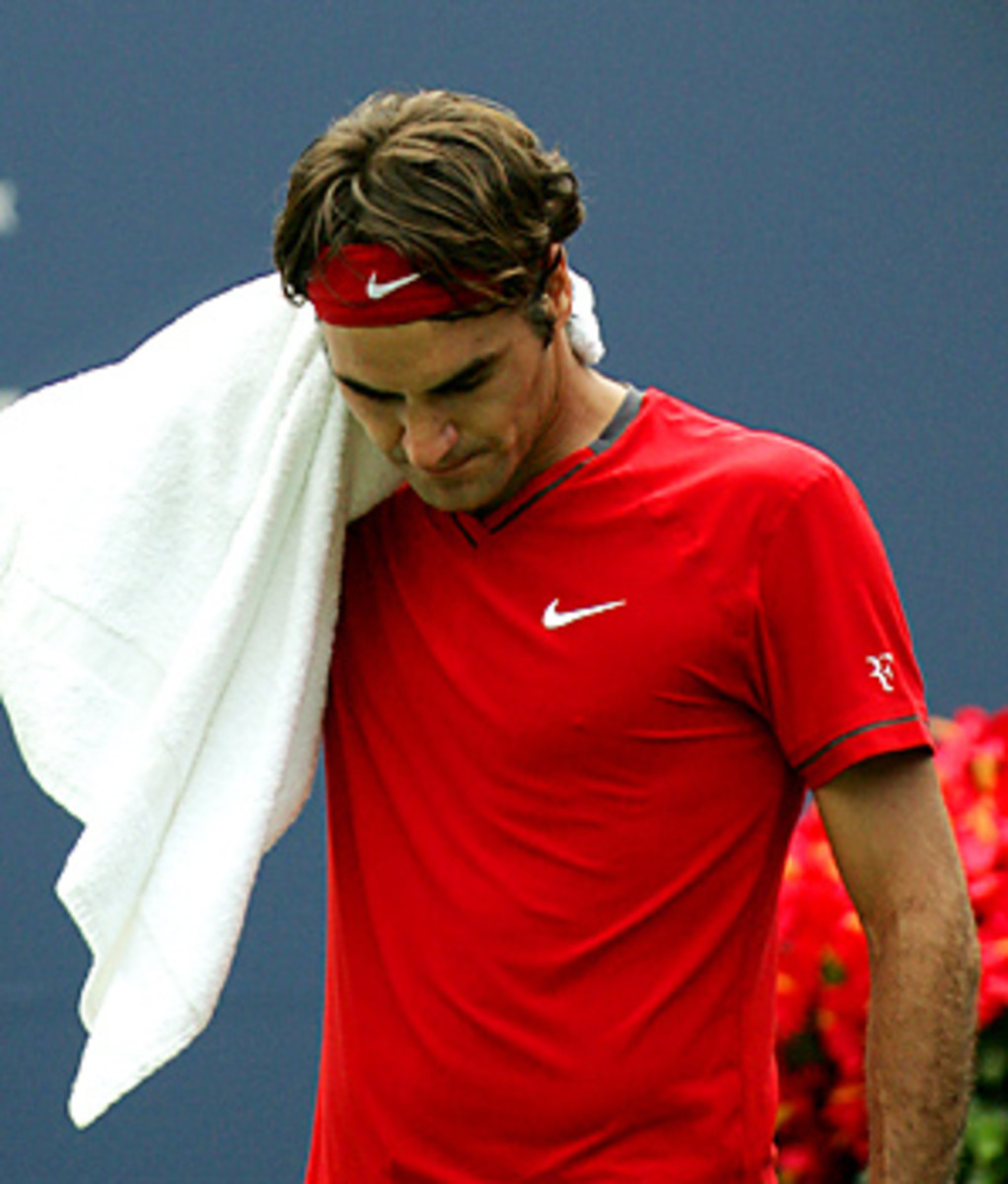Despite loss, don't write off Federer's glory days just yet
NEW YORK -- The temptation is to write off Roger Federer after Saturday's most recent come-from-ahead capitulation, a 6-7 (7), 4-6, 6-3, 6-2, 7-5 loss to Novak Djokovic that ensures the 30-year-old Swiss will finish without a Grand Slam title for the first year since 2002.
But to downplay Federer's brilliance is to slight Djokovic's otherworldly perseverance, athleticism and siege mentality, qualities that helped the top-ranked Serb escape certain elimination, improve to 63-2 overall this year and rally from a two-set deficit for the second time in his career.
The reality is matches like Saturday's unforgettable U.S. Open semifinal, which unfolded at dizzying heights of quality and endurance, are played along the edge of a straight razor. There is a winner and there is a loser but the space between is often microscopic -- a framed forehand here, a sprayed backhand there. Draw far-reaching conclusions at your own peril. "This is what happens when two top players meet each other," Djokovic said. "Just a couple of points decide the winner."
On Saturday it came down to a gamble, a shot they'll be discussing and analyzing and dialing up on YouTube years from now.
With Djokovic staring down the barrel of two match points late in the fifth set -- "I would lie if I said I didn't think I was going to lose," he'd later confess -- Federer uncoiled a 108-m.p.h. serve to the forehand side. Djokovic sprung to his right and somehow delivered a blazing cross-court winner that painted the line, an awesome, audacious shot that sent the mostly pro-Federer crowd into hysterics. From there, Djokovic broke, held serve, broke again and served out the match. "Snaps one shot," a somber Federer said afterward, "and then the whole thing changes."
Much will be made of Federer coughing up two-sets-to-none leads in consecutive major tournaments -- he squandered the same advantage opposite Jo-Wilfried Tsonga in the Wimbledon quarters -- but Saturday's defeat represents less a crash to earth than a descent from the stratosphere. Federer had been 178-0 while holding a two-set lead at Grand Slams before the Tsonga match. "Sometimes in sports it just goes the other way," Federer said. "Maybe you've already won so much that it evens out a bit sometimes."
Question Federer's finishing kick but don't question his game, which showed itself to be in resurgent form throughout the past two weeks. Instead, celebrate a blossoming golden age of men's tennis only suggested by the late-aughts peak of the Nadal-Federer rivalry -- where Djokovic, Federer and Nadal are forming a troika every bit as formidable as Connors, Borg and McEnroe.
Rare are the matches where the cavernous, 23,157-seat Arthur Ashe Stadium seems an appropriate venue for tennis, but Saturday's electric semifinal was one. Swells of energy flowed and ebbed throughout the match. So much about what makes the U.S. Open such a unique tournament played a principal role: a rain delay that forced the match to begin nearly an hour-and-a-half past the scheduled start time; wildly oscillating weather conditions including heavy clouds, extreme heat and sprinkles of rain (and that was just the first set!); even the star-studded backdrop, with Justin Timberlake, Michael Douglas and Jimmy Fallon among the celebs dotting the crowd. Record mogul Sean "Diddy" Combs watched from Djokovic's press box. (The two met at a party; "I can't talk about the details," Djokovic said.)
The first two sets was Federer at his autumnal best, playing aggressively with gorgeous and imaginative shotmaking. He's always been at his best when he's not intimidated by his backhand, deploying it as a change-of-pace tactic rather than a straight defensive shot. Djokovic showed plenty of fight -- saving three set points during the first-set tiebreaker -- but couldn't match the effortless intensity of Federer, who seemed hellbent on returning to the final for a seventh time in eight years.
Then Federer started making mistakes, the sort of mortal tennis fans have only recently become accustomed to. Djokovic wrested momentum with an early break in the third, emitting a guttural scream toward his box.
Federer was broken in the opening game of the fourth -- completely letting Djokovic off the hook psychologically -- and looked strangely out of his depth as the 24-year-old Serb converted his first 15 service points. By the fifth every point was an ovation, punctuating the kinds of hyperkinetic rallies only few players can sustain. Federer continued to crush sharply angled groundstrokes off both wings that plumbed the limits of Djokovic's impossible court coverage, but the Serb proved up to the task.
Afterward, Federer couldn't wait to get off the grounds, turning up at the interview desk less than 15 minutes after leaving the court. "It's awkward having to explain this loss because I feel like I should be doing the other press conference," he said.
Djokovic deserves every bit of credit for penning the latest improbable chapter in a season destined for the record books, but resist the urge to write Federer's epitaph along with it.
"That's why we all watch sports, isn't it? Because we don't know the outcome and everybody has a chance and until the very last moment it can still turn. That's what we love about sports, but it's also very cruel and tough sometimes," he said, before adding, "I will be extremely hungry going into Australia next year."






